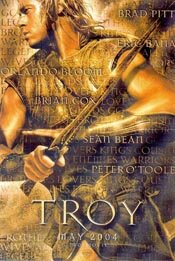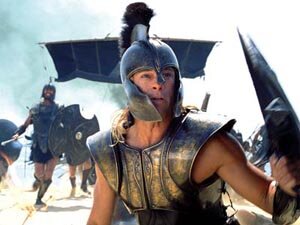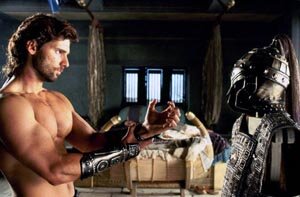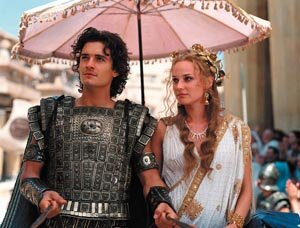 Directed by Wolfgang Peterson
Directed by Wolfgang Peterson
While many story ideas find their roots in history and literature, you don’t look to Hollywood for historical or literary accuracy. At least, not if you’re smart. You simply look for a good movie, which is what Troy, the movie, is.
Certainly, it draws on Homer and Virgil but that’s about as far as it goes. And that’s okay. As a movie, it works (although the ending seems a bit unfocused, perhaps).
In many ways, Troy is a late-fifties, early-sixties kind of Hollywood swords-and-sandals kind of extravaganza.
There are numerous stars, a variety of storylines intersecting and diverging, and great panoramic shots, albeit often done with CGI.

Troy tells the story of … well, Troy. The taking of Helen (Diane Kruger) by the Trojans (Paris – Orlando Bloom) from the Greeks (Menelaus – Brendan Gleeson). The assault on Troy by the Greeks, led by Agamemnon (Brian Cox). We get the Trojan king, Priam (Peter O’Toole). We see the idea man behind the Trojan Horse, Odysseus (Sean Bean).
And we get the heroes of the war, the Trojan’s Hector (Eric Bana) and the Greek’s Achilles (Brad Pitt). It’s these two around which the film revolves and where its strong spine resides.
While the marketing would have you think Brad Pitt as Achilles is the raison d’etre of the film, this is only partly true. It’s more accurate to say that the film is organized around Achilles’ story, which is the story of the fall of Troy.
But Achilles is portrayed as a myth rather than a man. And Pitt is excellent in the role. There is a required distance to his character and he does this perfectly.

For some reason, he is well-suited to this sort of thing – perhaps because the demands are more for a caricature than a character. (And I don’t mean that to be disparaging. But it really does call more for a mythic type than a deep character, though there are conflicts within the character.)
But the character we identify with, the one we sympathize with and root for, is Eric Bana’s Hector, hero of the ill-fated Trojans. He is the most human of all the film’s characters.
This may be because his Hector is pretty much the only one in the film who doesn’t want to be a hero.

He’s essentially a family man thrown into something he does not want but which he feels is his responsibility to deal with. He’s the son of the king, the eldest son. It’s his role to lead; it’s what is expected of him and he accepts the obligation, though not happily.
The best parts of his final battle with Achilles are the scenes leading up to it where he says his various goodbyes and looks scared shitless as he does. What makes him heroic is, despite his fears, he still goes out.
Contrast this to the character of Achilles who is always certain he will win or, if not that, really doesn’t care one way or the other because he has nothing to lose (as opposed to Hector who has a wife and child).

There are other excellent performances in Troy, including Brian Cox as the power hungry Agamemnon, Peter O’Toole as the wise (well, maybe not so wise) King Priam and Rose Byrne as the kidnapped Briseis, who acts as a kind of conscious of sorts, or at least a sounding board, for Achilles.
In other words, Troy makes for a very good film because despite its grand scale and embracing of Hollywood spectacle, it remains firmly rooted in a strong storyline and great performances. This is where it finds its strength.
In fact, the only possible complaint I have is the film’s length. But these sorts of things tend to be long and I can’t see how it could have been shortened.


